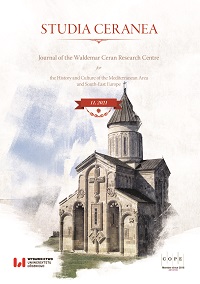The De haeresibus et synodis of Germanos I of Constantinople as a Source on Early Byzantine Heresies? Prospects of a Critical Edition
The De haeresibus et synodis of Germanos I of Constantinople as a Source on Early Byzantine Heresies? Prospects of a Critical Edition
Author(s): Johann Anton ZiemeSubject(s): History, Middle Ages, Theology and Religion
Published by: Wydawnictwo Uniwersytetu Łódzkiego
Keywords: De haeresibus et synodis; Patriarch Germanus I of Constantinople; critical edition; Christian heresies; Church Councils; Byzantium
Summary/Abstract: A new, critical edition of the 8th-century treatise De haeresibus et synodis (CPG 8020) by Patriarch Germanus I of Constantinople is in progress; it will provide new insights, especially into the large extent of sources that were copied or paraphrased. The article takes a close look at three chapters that could be considered as sources for different Christian heresies (Manichaeism, Montanism and Christological dissenters) in 8th-century Byzantium and some of the first new text- and sourcecritical findings. The accounts on Manichaeism and Montanism are based on older, lost sources and can therefore not be consulted as historical sources on these heresies in the Early Byzantine age. The account of the Ecumenical Councils involved in the Christological controversies attributes faith formulas to Councils that did not actually issue them and thus must be dismissed as a historical source on the course of these controversies as well. Nevertheless all three chapters, like the rest of the treatise, testify to the views of an Early Byzantine theologian on heresies and Church Councils and to how he reached his views. This scope for further study is deduced from the character of the text itself and thus especially appropriate.
- Issue Year: 2021
- Issue No: 11
- Page Range: 493-512
- Page Count: 20
- Language: English

